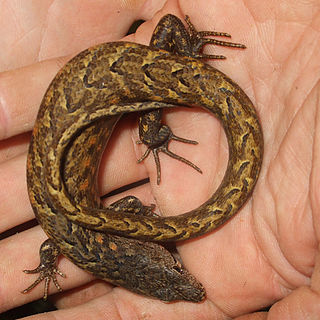
Skinks are lizards belonging to the family Scincidae, a family in the infraorder Scincomorpha. With more than 1,500 described species across 100 different taxonomic genera, the family Scincidae is one of the most diverse families of lizards. Skinks are characterized by their smaller legs in comparison to typical lizards and are found in different habitats except arctic and subarctic regions.

The Bermuda skink, longnose skink, or Bermuda rock lizard is a critically endangered species and the only endemic land-living vertebrate of Bermuda. It is a relatively small skink : adults reach an average snout-to-vent length of about 8 cm (3.1 in).

A species that is extinct in the wild (EW) is one that has been categorized by the International Union for Conservation of Nature as known only by living members kept in captivity or as a naturalized population outside its historic range due to massive habitat loss.

The Blue Mountains water skink or Blue Mountains swamp-skink is a species of skink in the family Scincidae. An endangered species, it is found only in restricted parts of the mountains of southeastern Australia.
Carinascincus palfreymani, known commonly as the Pedra Branca skink, as well as the Palfreyman's window-eyed skink, the Pedra Branca cool-skink, or the red-throated skink, is a species of skink in the family Scincidae. The species is endemic to Australia, and is restricted to the windswept Pedra Branca, an island off southern Tasmania of only 2.5 ha, where it is dependent on the seabird colonies. It is the only lizard species found on the island.

The chevron skink, is a large species of skink endemic to New Zealand, found only on Great and Little Barrier islands in the Hauraki Gulf. A cryptic forest dweller, it can hide underwater, and is under threat from introduced rats.

The Seychelles skink also known as the Mangouya, is a species of skink in the family Scincidae. It is endemic to the Seychelles.

Carinascincus metallicus, the metallic cool-skink or metallic skink is a species of skink in the family Scincidae. It is endemic to Australia, found in southern Victoria, as well as in Tasmania where it is the most widespread and common lizard, occurring on many offshore islands in Bass Strait as well as the mainland. It gives birth to live young. It is highly variable in colour and pattern, and may be a complex of closely related species.

The spotted skink, sometimes called the ocellated cool-skink or ocellated skink, is a skink endemic to Tasmania, Australia. It is a ground-dwelling, viviparous species, usually found in rocky habitats, and widespread in the northern and eastern parts of the state, as well as in the eastern Bass Strait islands. It is often found at Arthurs Lake in the Central Highlands of Tasmania.
Techmarscincus is a genus of skink, a lizard in the family Scincidae. The genus is endemic to Australia, and is monotypic, containing the sole species Techmarscincus jigurru.
The eastern crevice-skink is a species of large skink, a lizard in the family Scincidae. The species is native to eastern Australia.
The Eastern Ranges rock-skink is a species of skink, a lizard in the family Scincidae. The species is endemic to eastern Australia.
The Mt. Surprise litter-skink is a species of skink found in Queensland in Australia.

The Guinea lidless skink is a species of lidless skinks in the family Scincidae. The species is found on Príncipe, Ilhéu das Rolas, and São Tomé.
The cone-eared calyptotis is a species of skink found in Queensland in Australia.
The red-tailed calyptotis is a species of skink found in New South Wales in Australia. They are oviparous reptiles, and they are apart of the scincidae family.
The scute-snouted calyptotis is a species of skink found in New South Wales and Queensland in Australia.
The broad-templed calyptotis is a species of skink found in Queensland in Australia.
The ghost skink is a species of skink found in Australia.









